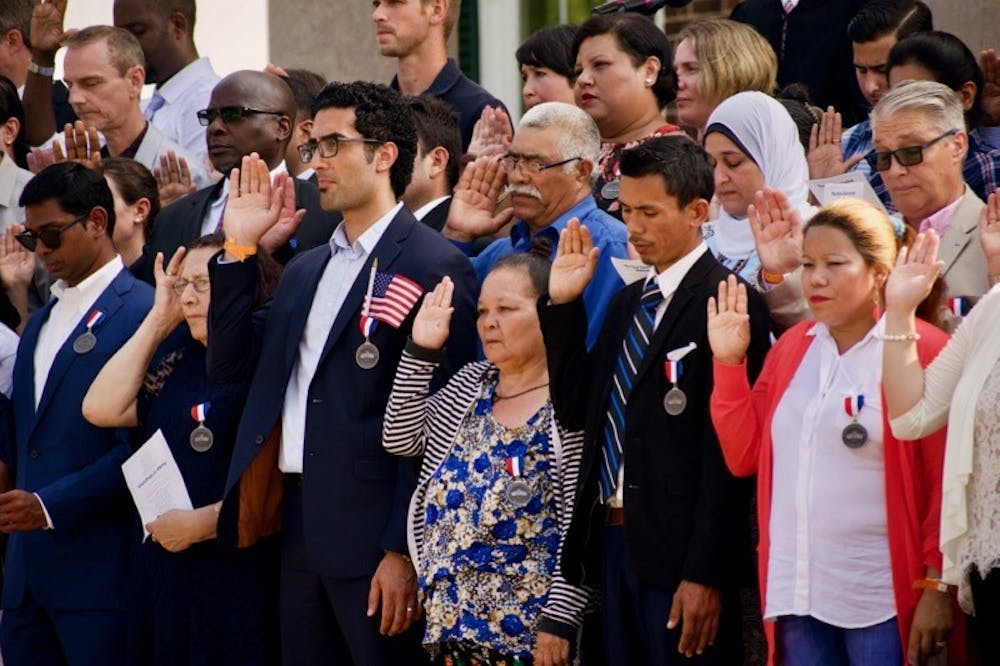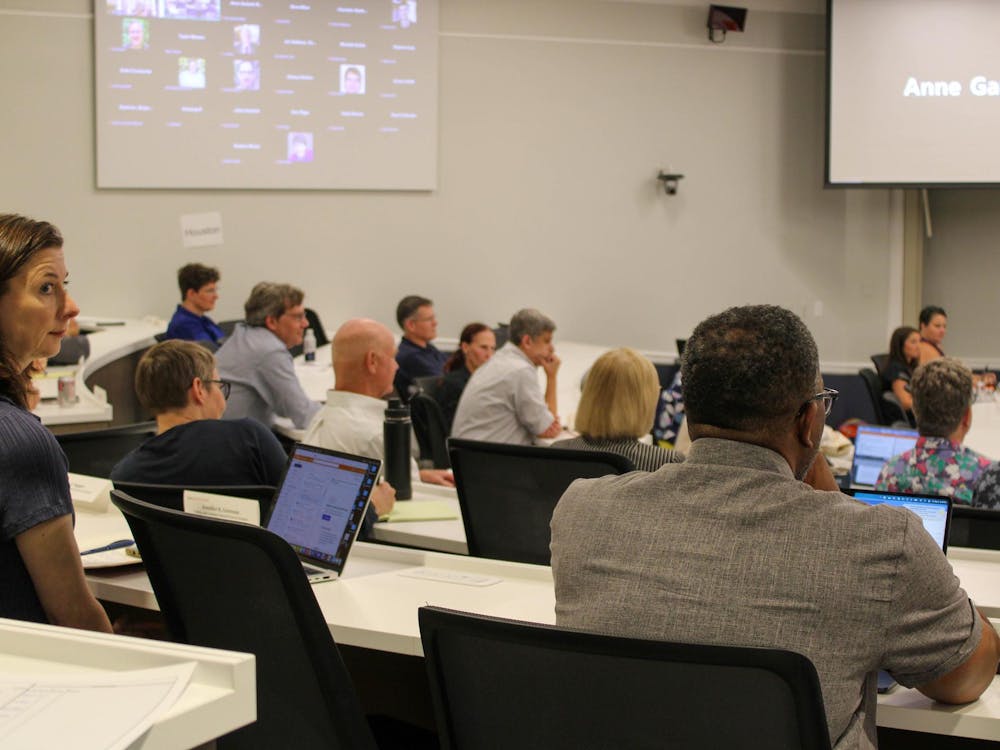Standing proudly on the steps of Thomas Jefferson’s home — some sporting American flags or red, white and blue and all wearing a medallion engraved with the stately house behind them — 67 individuals became U.S citizens Wednesday at Monticello’s 56th annual Independence Day Celebration and Naturalization Ceremony.
The new citizens, hailing from 35 different countries, took the oath of citizenship as part of America’s longest running naturalization ceremony outside of a courtroom since 1962. The event featured a keynote address from Andrew Tisch, chairman of the Executive Committee of Loews Corporation and co-author of the newly released book on immigration, “Journeys: An American Story.
The 67 individuals — all residents of the Western District of Virginia — were selected for the naturalization ceremony at Monticello by the Department of Homeland Security through the U.S. Citizenship and Immigration Service. The oath of citizenship was presided over by Chief Judge Michael Urbanski of the U.S. District Court of the Western District of Virginia.
“We are bound together, we are linked together as one people,” Urbanski said.
Hundreds of people attended the public event on the lawn of Monticello which began with a recitation of the preamble of the Declaration of Independence, delivered by the Hon. John Charles Thomas.
“Never before had a nation been born out of ideas rather than force or ethnicity,” said Leslie Greene Bowman, president of the Thomas Jefferson Foundation — a private non-profit that owns and manages Monticello — as she welcomed the audience. “In a revolutionary separation document, Jefferson imbedded fundamental principles of liberty, equality and self-government. Principles that still bind us today as Americans.”
It was the idea of those founding principles that resonated with Melissa Kitto, who is originally from New Zealand and officilized her citizenship Wednesday after living in the U.S. for 14 years. Kitto said having the ceremony at Monticello reminded her of the original intentions of the founding fathers.
“It’s a symbol of the positive values that were intended by the founding fathers and … trying to detach from the ways that things have [become] skewed in modern times,” Kitto said.
Kitto said a sense of frustration at being impacted by U.S. elections but being unable to vote in them helped motivate her to finalize her citizenship. She said the most recent presidential election especially “stood a lot of people up,” including herself.
Kitto moved to the U.S. when she married her husband and has since started her own business.
For Isatu Kamara, a rising senior at James Madison University and originally from Sierra Leone, moving to America with her family in 2009 enabled her to pursue her education.
“I have so much passion about becoming a chemist … but being in a country that’s like growing up in a war place, I knew that was never going happen at that time,” Kamara said. “Without being here, I would never have been able to explore what I’m doing.”
Kamara now conducts research at JMU and plans to apply to pharmaceutical school after graduation. She described the excitement of the day, beyond the holiday she usually celebrates.
“This is July Fourth, I’m celebrating with my family, I'm celebrating with other people, and then having my citizenship,” Kamara said. “I don’t know how much I can describe the excitement.”
For Luigi Benedetto, who is originally from Italy, Wednesday’s ceremony was about timing. Having lived in the United States for nearly 30 years and earned his bachelor’s degree in 2012, he said he wasn’t ready to become a citizen until now.
“Becoming a citizen for me is more like a privilege — get to know the country, get to know the system,” Benedetto said. “It’s all about timing. I wasn't ready, I guess. Now it is the time.”
Following the recitation of the oath, the names of each of the newly naturalized citizens was read aloud as they received their official certificates of citizenship.
“Your story and the stories of your children and grandchildren to come, is my story,” Urbanski said following the presentation of the certificates and a live performance of the national anthem. “As a nation of immigrants, it is the story of all of us. Today you join a new family, our American family. A family built on principles of hardwork, individual freedom, tolerance and personal responsibility.”
Guest speaker Tisch also focused on the origin of America as a nation of immigrants in his keynote address preceding the ceremony.
“Many people refer to our country as a melting pot,” Tisch said. “We see America … as a mosaic with tiles of many different colors, shapes, sizes and textures. The grout that holds us together is the common desire for freedom, justice and opportunity.”
Tisch acknowledged the current divisive dialogue surrounding immigration in America — related to policies such as the Trump administration's separation of immigrant parents from their children at the U.S.-Mexico border and the Supreme Court’s recent ruling to uphold Trump’s travel ban on seven predominantly Muslim countries.
“We gather at a time when some Americans are questioning the value of immigration and immigrants,” Tisch said. “While America is a nation of immigrants, we have a long and troubling history of barricading the doors to new arrivals.”
The ceremony concluded with a live performance of America the Beautiful and remarks from Bowman before opening up into an independence day celebration.
“We’ve always been a nation of immigrants and we’ve always corrected our mistakes that we’ve made,” Tisch said. “This is a welcoming country in the end and I think that’s the important message.”







